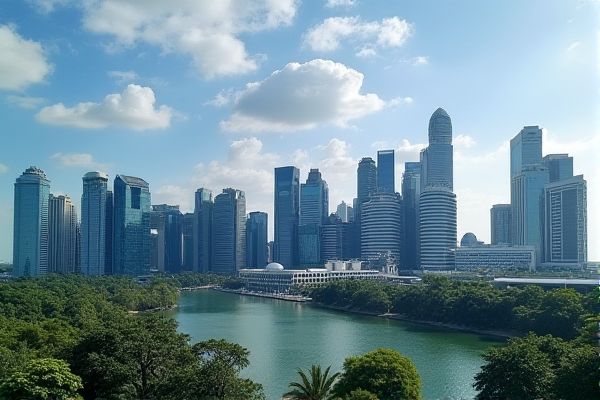
Moving to Singapore checklist: Research visa requirements. Understand cost of living. Arrange accommodation in advance. Open a local bank account. Familiarize with local transportation. Learn about healthcare system. Register for tax purposes. Explore local job opportunities. Get relevant vaccinations. Pack for tropical climate.
Research visa requirements.
To move to Singapore, it is essential to research the visa requirements by first checking if your country needs a visa. Understanding the types of visas available and adhering to the submission process through the ICA or Singapore Overseas Missions is crucial. Additionally, ensuring compliance with the latest travel requirements and advisories will help streamline your entry into this vibrant city-state.
Understand cost of living.
The cost of living in Singapore can range from approximately S$1,600 to S$11,000 per month, depending on factors such as housing, education, transportation, and lifestyle choices. Key expenses include housing, which can be particularly high, as well as costs for utilities, public transport, and daily essentials. For more detailed information, you can explore the Cost of Living in Singapore to better understand the financial dynamics of residing in this vibrant city-state.
Arrange accommodation in advance.
When moving to Singapore, it is crucial to arrange accommodation in advance, considering options such as HDB Flats, condominium units, serviced apartments, and shared accommodation, each offering different levels of affordability, amenities, and convenience. Start scouting for rentals or properties available for sale well in advance, considering factors like proximity to the workplace, public transportation, and shopping points to ensure a smooth transition. For more detailed insights into affordable housing options, visit Expatbuddy. This planning can significantly impact your overall experience in the city, easing your adaptation to the vibrant Singaporean lifestyle.
Open a local bank account.
To open a local bank account in Singapore, foreigners need a valid passport, proof of residential address, and a relevant pass such as an Employment Pass or Student Pass. The process involves choosing a bank, preparing the necessary documents, submitting the application, completing verification, and making an initial deposit. For more detailed information, you can refer to the How to Open a Bank Account guide, which provides comprehensive steps and considerations for foreigners aiming to establish their banking in Singapore.
Familiarize with local transportation.
To familiarize yourself with local transportation in Singapore, it is essential to understand the extensive MRT network, which comprises six color-coded lines, as well as the comprehensive bus network that boasts over 5,000 stops. Utilizing EZ-Link cards or contactless payment methods ensures convenient travel throughout the city. Furthermore, taxis and private hire cars are readily available, with regulated fares and easy booking options. For more detailed information, consider consulting the Beginners Guide to Singapore's Public Transport System for an in-depth overview.
Learn about healthcare system.
Singapore's healthcare system is a mix of public and private sectors, offering universal coverage funded through government subsidies, mandatory savings known as Medisave, and insurance schemes like MediShield Life and MediFund. This comprehensive system ensures access to quality healthcare for all citizens and permanent residents. Learn more about how this innovative system works on the Healthcare in Singapore webpage, which provides an in-depth explanation of how these components contribute to an effective healthcare framework.
Register for tax purposes.
To register for tax purposes in Singapore, you must determine if you are considered a tax resident, which generally means staying in the country for 183 days or more within a year. If you meet this criterion, the next step is to file the appropriate tax form, such as Form B, B1, or M, by the specified deadline of April 15 for paper filing or April 18 for e-filing. An important consideration is that if your income exceeds SGD 20,000, filing a personal tax return with the Inland Revenue Authority of Singapore (IRAS) becomes mandatory.
Explore local job opportunities.
To explore local job opportunities in Singapore, utilize platforms like JobStreet, Indeed, and LinkedIn, and consider the dynamic job market in sectors such as finance, technology, and healthcare, where salaries are competitive and additional benefits are often included. For more insights, visit the Moving to Singapore for Expats page, which offers invaluable guidance for those seeking to thrive in this vibrant city-state. This resource can be a pivotal tool for understanding the employment landscape and making informed career decisions in Singapore.
Get relevant vaccinations.
When moving to Singapore, it is essential to discuss and obtain the required vaccinations with a travel doctor, which may include Tetanus, Hepatitis A, Hepatitis B, Typhoid, and Rabies. Additionally, make copies of your medical records, including those for your pets. For a comprehensive guide on what to prepare before relocating, consider creating a detailed moving checklist, ensuring nothing is overlooked during your transition. Proper preparation will facilitate a smoother move and help prevent any last-minute complications.
Pack for tropical climate.
To pack for Singapore's tropical climate, bring lightweight, breathable clothing such as t-shirts, shorts, and summer dresses, along with essentials like sunscreen, insect repellent, a sun hat, sunglasses, and a light rain jacket or poncho to handle the heat and sudden showers. For more detailed guidance, refer to the Travel Packing Checklists that specifically cater to planning a successful trip to Singapore. Remember, keeping cool and protected is key to enjoying your travels in this vibrant city.
